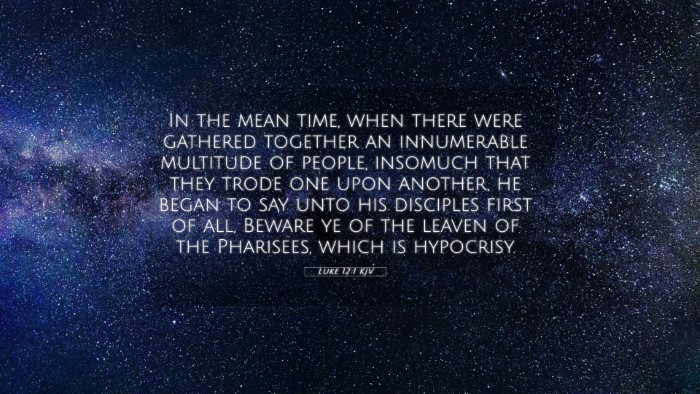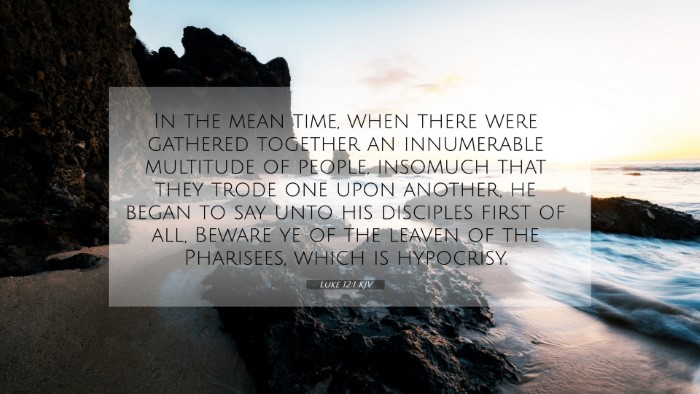Understanding Luke 12:1
Luke 12:1 states: "In the meantime, when there were gathered together an innumerable multitude of people, insomuch that they trode one upon another, he began to say unto his disciples first of all, Beware ye of the leaven of the Pharisees, which is hypocrisy." This verse introduces a critical warning from Jesus to His disciples amidst a large crowd, focusing particularly on the dangers of hypocrisy.
Commentary Insights
In synthesizing insights from Matthew Henry, Albert Barnes, and Adam Clarke, we delve into the deeper meanings and implications of this verse.
Hypocrisy as Spiritual Leaven
Matthew Henry emphasizes that hypocrisy is compared to leaven, which starts small but can corrupt an entire batch. This analogy illustrates the destructive nature of insincere faith and behavior. Henry points out how Jesus warns His followers to be vigilant against such influences, recognizing that hypocrisy was prevalent among the Pharisees.
Albert Barnes elaborates on the nature of hypocrisy, noting that it leads to a disconnect between one's profession of faith and actual behavior. He interprets the call to “beware” as a necessity for the disciples to maintain integrity and authenticity in their witness, contrasting the outward appearance of the Pharisees with the inward spiritual reality they lack.
Adam Clarke adds that the multitude gathered around Jesus served as a pivotal context for this teaching. He interprets the large crowd as a testament to Jesus' influence but also as a cautionary tale for the disciples—a reminder that not everyone drawn to Jesus is genuine in their faith. Clarke highlights the importance of discerning true faith from mere outward expressions.
Connections to Other Scripture
This verse resonates with numerous other biblical teachings and can be cross-referenced to enhance understanding. Here are 10 key verses that relate to Luke 12:1:
- Matthew 7:15: "Beware of false prophets, which come to you in sheep's clothing, but inwardly they are ravening wolves." This reflects concerns about external appearances versus internal realities.
- Matthew 15:12-14: "Then came his disciples, and said unto him, Knowest thou that the Pharisees were offended, after they heard this saying?" Here, Jesus rebukes the religious leaders, emphasizing their hypocrisy.
- Luke 11:37-44: This passage includes a series of woes to the Pharisees which closely aligns with the issues of outward righteousness masking inward corruption.
- Galatians 5:9: "A little leaven leaveneth the whole lump." Paul echoes the concept of little sins causing great downfall.
- 1 Peter 2:1: "Wherefore laying aside all malice, and all guile, and hypocrisies, and envies, and all evil speakings." Peter encourages authentic Christian living.
- James 1:26: "If any man among you seem to be religious, and bridleth not his tongue, but deceiveth his own heart, this man's religion is vain." James addresses the danger of self-deception akin to hypocrisy.
- Revelation 3:16: "So then because thou art lukewarm, and neither cold nor hot, I will spew thee out of my mouth." A warning against being spiritually indifferent.
- Luke 6:42: "Either how canst thou say to thy brother, Brother, let me pull out the mote that is in thine eye, when thou thyself beholdest not the beam that is in thine own eye?" This emphasizes the double standard of hypocritical judgment.
- Romans 2:1: "Therefore thou art inexcusable, O man, whosoever thou art that judgest: for wherein thou judgest another, thou condemnest thyself; for thou that judgest doest the same things." Paul reinforces the dangers of hypocrisy within the judgment of others.
- Isaiah 29:13: "Wherefore the Lord said, Forasmuch as this people draw near me with their mouth, and with their lips do honor me, but have removed their heart far from me, and their fear toward me is taught by the precept of men." This Old Testament verse connects the theme of hypocrisy throughout Scripture.
Thematic Bible Connections
The theme of hypocrisy in the church and society is echoed throughout the Bible. From the warnings of the Prophets to the teachings of Jesus and the Apostles, there is a persistent call for sincerity, integrity, and authenticity in one’s faith.
Tools for Understanding Hypocrisy in Scripture
To further explore these biblical themes, individuals can utilize various tools for Bible cross-referencing. Here are some resources:
- Bible Concordance: A listing of words and their locations for deeper study.
- Bible Cross-reference Guide: Helps locate verses that connect to a theme or specific scripture.
- Cross-reference Bible Study: Techniques for examining biblical texts in relation to each other.
- Bible Chain References: Methods to track themes or messages through interconnected verses.
- Comprehensive Bible Cross-reference Materials: Books and resources that provide systematic approaches to scripture linkage.
Final Reflection
Luke 12:1 serves as a potent reminder of the need to cultivate genuine faith that resists the influence of hypocrisy. By examining cross-references and employing study tools, believers can deepen their understanding and avoidance of spiritual duplicity.
Conclusion
In summary, Luke 12:1 invites individuals into a serious contemplation of their spiritual lives, encouraging a steadfast commitment to authenticity in their relationship with God. Through the combined insights of various commentaries and scriptural cross-referencing, we gain a rich perspective on the implications of hypocrisy and the call to genuine discipleship.



















